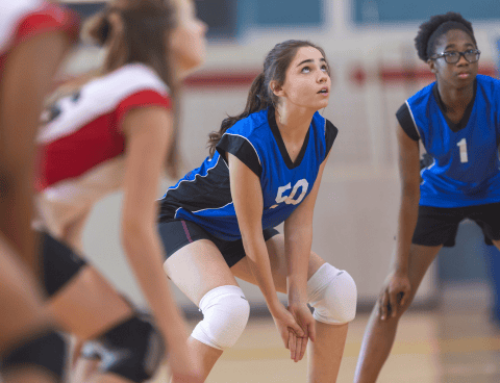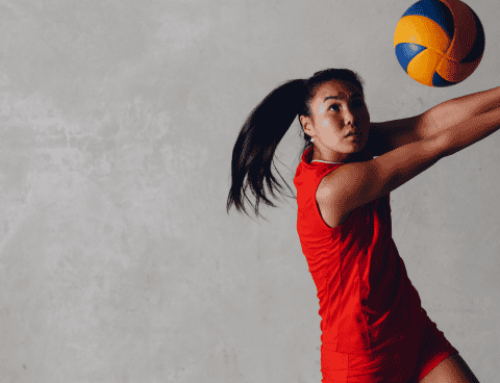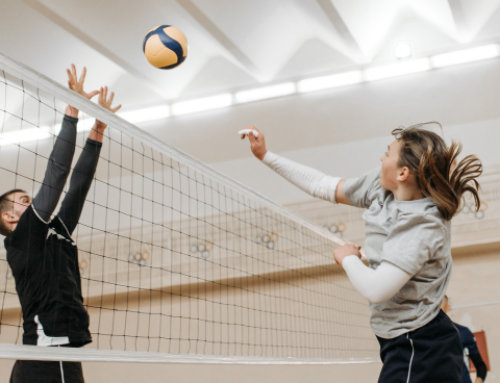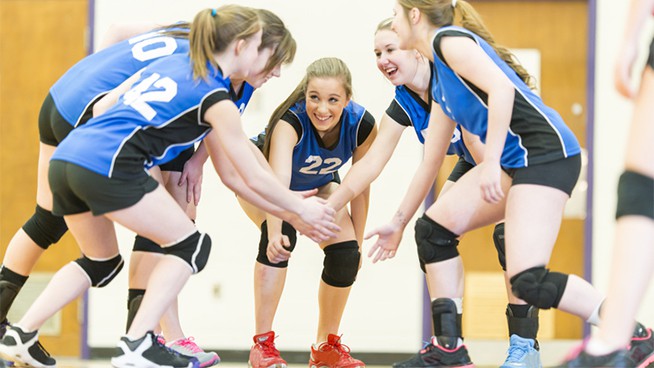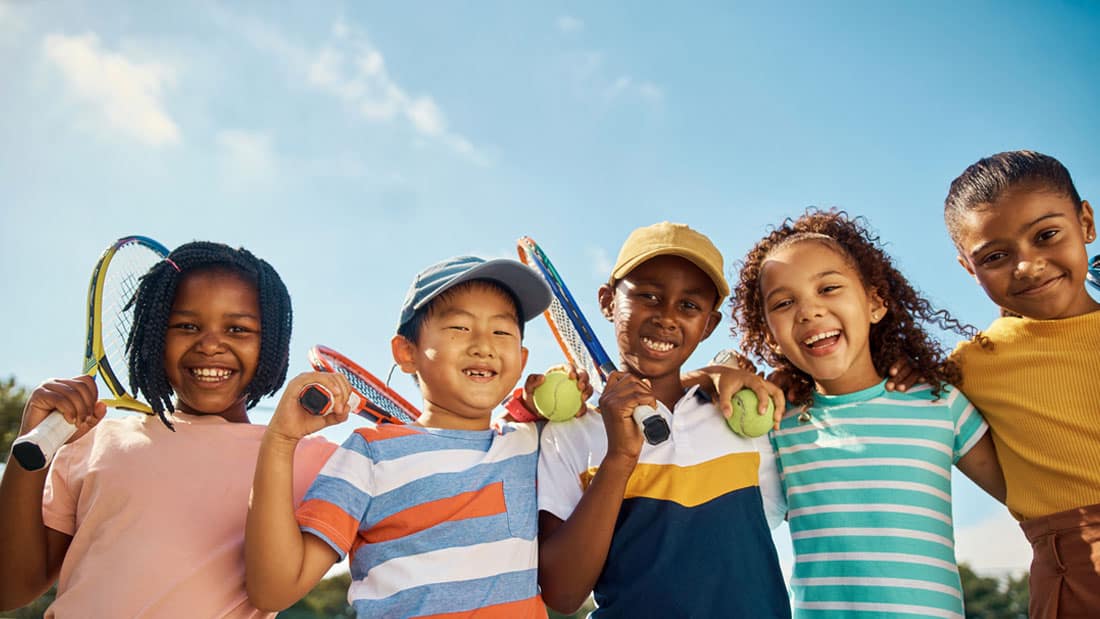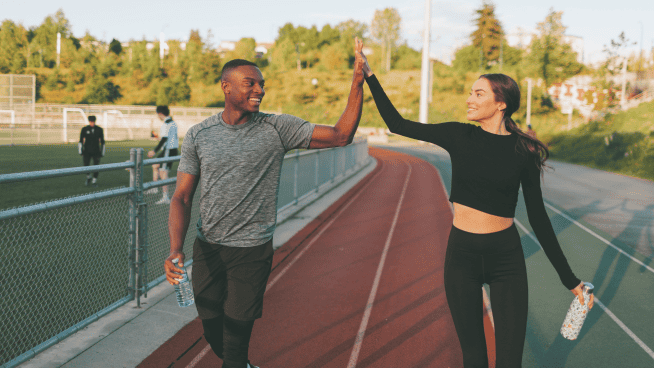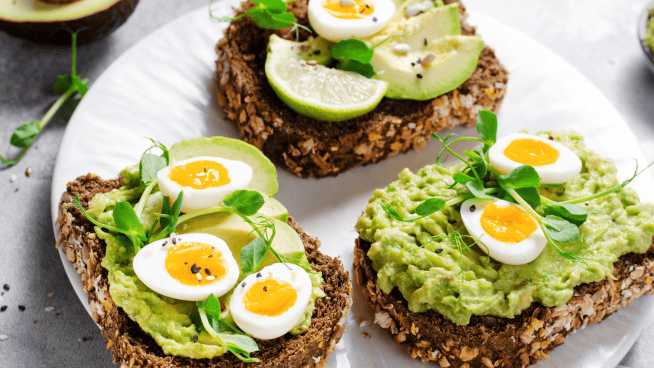Olympic Beach Volleyball Player Lauren Fendrick Reveals How She’s Preparing for the Rio Games

American women have dominated beach volleyball at the Olympics, winning Gold in the previous three quadrennial Games. However, with the retirement of Misty May Treanor, there’s a changing of the guard on the USA team.
Now two new teams are representing the United States. Olympic rookie Lauren Fendrick, who is teamed up with Brooke Sweat, is hoping to continue America’s success in the sand despite the Games being played in Brazil, which fields some of their strongest competitors.
We had the opportunity to chat with Fendrick about her experiences leading up to the Games and about Jolyn swimwear, which she’ll be wearing as she competes for a medal. Here’s what we learned from Fendrick.
STACK: What’s the journey been like for you leading up to the Olympics?
Lauren Fendrick: Brooke and I have been playing together three years now, three seasons. That’s when our journey started together. We got together with making the Olympics in mind, it’s a year and a half qualification process that started in 2015 and ended June 13th of this year. That was our goal. That was our focus. That’s kind of what we shaped our training, our competition schedule around. We saw successes and failures and made our adjustments. It’s been a lengthy process.
What’s been the toughest part of it?
There are a lot of tough things involved. I think the mental side of it . . . there’s doubts that you have along the way, injuries we were dealing with. A couple of injuries, I mean every team does, that’s nothing new. But yeah, I think having the uncertainty of not knowing what’s going to happen but trusting your process and not looking left or looking right, like what are they doing or what are they not doing? What else should I be doing? And trusting your own process, trusting the team and the people you’ve put around you and the path that you’re on and making it your own journey instead of trying to just kind of compare yourself to what other people are doing. I think that was definitely a hard part, because you want it so bad that you don’t want to miss anything. It’s hard not to look around and compare yourself and doubt yourself even at times.
What did it feel like when you finally knew you officially made the Olympic team?
When it was official, I mean it was a really, really special moment. Brooke and I kind of looked at each other and just had the most authentic, biggest smiles. Our family was there in Hamburg, so we got to go out to dinner all together and celebrate. And it was really a special feeling to reach that milestone. And to get to celebrate with family was just icing on the cake.
How does your approach change leading up to Rio?
We’re still in our same game plan. From the beginning, it’s always been about getting to Rio and medaling in Rio so we’re continuing that process of fine tuning our skills, getting strong in the weight room, making sure we do everything we can to keep our bodies healthy and a lot of mental training. Meditation, visualization . . .doing what we need to do to see what we want to happen in our minds before we even get there.
What do your workouts look like?
So our trainer is Anthony Darmiento. We work out at the USA volleyball facility in Torrance, California. He designs the workouts, and for me it’s a lot of explosive, speed-based stuff. There’s some Olympic lifting, and we measure a lot of things. We have Tendo units that measure bar speed so we’re not only focused on how much we’re lifting, but how fast we’re lifting the weight. And you know measuring our jump and training to translate things from the weight room that’s going to make us better volleyball players—things like a faster first step—and then we do conditioning on top of that, either bike conditioning or sled or—I actually do most of my conditioning in the sand. That’s without a ball.
What are your expectations going into Rio?
We’re hoping, training and preparing to get a medal. It’s going to be tough, all the teams are tough. Everyone is playing at a really high level. And I think the energy down there with beach volleyball being such a premier sport in Brazil. The fans are going to be crazy, passionate and knowledgeable. So it’s going to be a really exciting opportunity, and I think it’s just going to raise the level of play. I’m so excited to be a part of it, and really all that I’m focused on is leaving it all out on the court. And being in every moment and . . . gosh it sounds so cliché when you say it out loud. It’s really just controlling what you can control basically.
What advice would give to young volleyball players whose goal is to play at an elite level?
Gosh, it kind of depends on where they’re at with their career and what they’re kind of dealing with. But I think for female athletes, I think having a focus on positive self-talk. I think as female athletes we can be very hard on ourselves and almost too critical. So being able to . . . when those moments are needed to believe that you know whether it’s—let me give you an example. It’d be like I’m going to serve an ace right now and really believing that and having that positive self-talk that isn’t going to get in your way and hold you back. It’s something that I still work on, so I think it’s definitely a good focus for the younger generation.
So let’s talk about Jolyn. How did you get involved with them?
My neighbor was involved with them and his niece works for them, and he introduced me to the line. He was like, “Oh, this is a really great company, they have really great suits.” They mostly work with water polo and swimmers so I checked them out and contacted them and we met and talked. And you know, just a really easy company to get behind. All fitted to athletes, so that’s awesome. You don’t see that typically with swimsuit lines. They’re designed for performance, whether it’s in the water or on the sand, and you really don’t have to worry about something like a string coming off or a suit flipping up. It’s solid construction and it’s not going anywhere. So you can just focus on what you’re doing, whether it’s a water activity or playing on the beach. You can really go for it and not worry about your suit. And they’re super cute, too.
What’s it like to be involved in a swimwear brand that’s centered on athletes?
I think especially as female athletes, having a strong community base to support each other and support one another—it’s huge. It’s super important and it kind of goes in line with what I was talking about earlier, just, you know, not feeling like you stand out as a strong female athlete. I know growing up that was something that was hard when sometimes I succeeded and felt like I stood out and other girls maybe like resent you a little bit. But to have strong, to have other strong female athlete role models I think is great for young kids who know that sports is their thing. You know everybody has their thing, and if that’s your thing, having other female athletes to relate to and connect to and to aspire to be like is really helpful.
Talk about Jolyn’s emphasis on promoting a positive body image.
They deal with a bunch of different sports and a bunch of different body types. And they have suits that fit everybody. So I think for me when I’m thinking about my body, I want to be as strong and explosive and powerful as I can be for my sport. And whatever that ends up looking like, that’s what I want. So I don’t want some magazine telling me what I’m supposed to look like. To have a company that reflects that culture . . . female athletes like that. That’s the role model, that’s what you want to look like and that’s what they use for their prototypes and for their fittings and for their models. That’s huge.
RECOMMENDED FOR YOU
Olympic Beach Volleyball Player Lauren Fendrick Reveals How She’s Preparing for the Rio Games

American women have dominated beach volleyball at the Olympics, winning Gold in the previous three quadrennial Games. However, with the retirement of Misty May Treanor, there’s a changing of the guard on the USA team.
Now two new teams are representing the United States. Olympic rookie Lauren Fendrick, who is teamed up with Brooke Sweat, is hoping to continue America’s success in the sand despite the Games being played in Brazil, which fields some of their strongest competitors.
We had the opportunity to chat with Fendrick about her experiences leading up to the Games and about Jolyn swimwear, which she’ll be wearing as she competes for a medal. Here’s what we learned from Fendrick.
STACK: What’s the journey been like for you leading up to the Olympics?
Lauren Fendrick: Brooke and I have been playing together three years now, three seasons. That’s when our journey started together. We got together with making the Olympics in mind, it’s a year and a half qualification process that started in 2015 and ended June 13th of this year. That was our goal. That was our focus. That’s kind of what we shaped our training, our competition schedule around. We saw successes and failures and made our adjustments. It’s been a lengthy process.
What’s been the toughest part of it?
There are a lot of tough things involved. I think the mental side of it . . . there’s doubts that you have along the way, injuries we were dealing with. A couple of injuries, I mean every team does, that’s nothing new. But yeah, I think having the uncertainty of not knowing what’s going to happen but trusting your process and not looking left or looking right, like what are they doing or what are they not doing? What else should I be doing? And trusting your own process, trusting the team and the people you’ve put around you and the path that you’re on and making it your own journey instead of trying to just kind of compare yourself to what other people are doing. I think that was definitely a hard part, because you want it so bad that you don’t want to miss anything. It’s hard not to look around and compare yourself and doubt yourself even at times.
What did it feel like when you finally knew you officially made the Olympic team?
When it was official, I mean it was a really, really special moment. Brooke and I kind of looked at each other and just had the most authentic, biggest smiles. Our family was there in Hamburg, so we got to go out to dinner all together and celebrate. And it was really a special feeling to reach that milestone. And to get to celebrate with family was just icing on the cake.
How does your approach change leading up to Rio?
We’re still in our same game plan. From the beginning, it’s always been about getting to Rio and medaling in Rio so we’re continuing that process of fine tuning our skills, getting strong in the weight room, making sure we do everything we can to keep our bodies healthy and a lot of mental training. Meditation, visualization . . .doing what we need to do to see what we want to happen in our minds before we even get there.
What do your workouts look like?
So our trainer is Anthony Darmiento. We work out at the USA volleyball facility in Torrance, California. He designs the workouts, and for me it’s a lot of explosive, speed-based stuff. There’s some Olympic lifting, and we measure a lot of things. We have Tendo units that measure bar speed so we’re not only focused on how much we’re lifting, but how fast we’re lifting the weight. And you know measuring our jump and training to translate things from the weight room that’s going to make us better volleyball players—things like a faster first step—and then we do conditioning on top of that, either bike conditioning or sled or—I actually do most of my conditioning in the sand. That’s without a ball.
What are your expectations going into Rio?
We’re hoping, training and preparing to get a medal. It’s going to be tough, all the teams are tough. Everyone is playing at a really high level. And I think the energy down there with beach volleyball being such a premier sport in Brazil. The fans are going to be crazy, passionate and knowledgeable. So it’s going to be a really exciting opportunity, and I think it’s just going to raise the level of play. I’m so excited to be a part of it, and really all that I’m focused on is leaving it all out on the court. And being in every moment and . . . gosh it sounds so cliché when you say it out loud. It’s really just controlling what you can control basically.
What advice would give to young volleyball players whose goal is to play at an elite level?
Gosh, it kind of depends on where they’re at with their career and what they’re kind of dealing with. But I think for female athletes, I think having a focus on positive self-talk. I think as female athletes we can be very hard on ourselves and almost too critical. So being able to . . . when those moments are needed to believe that you know whether it’s—let me give you an example. It’d be like I’m going to serve an ace right now and really believing that and having that positive self-talk that isn’t going to get in your way and hold you back. It’s something that I still work on, so I think it’s definitely a good focus for the younger generation.
So let’s talk about Jolyn. How did you get involved with them?
My neighbor was involved with them and his niece works for them, and he introduced me to the line. He was like, “Oh, this is a really great company, they have really great suits.” They mostly work with water polo and swimmers so I checked them out and contacted them and we met and talked. And you know, just a really easy company to get behind. All fitted to athletes, so that’s awesome. You don’t see that typically with swimsuit lines. They’re designed for performance, whether it’s in the water or on the sand, and you really don’t have to worry about something like a string coming off or a suit flipping up. It’s solid construction and it’s not going anywhere. So you can just focus on what you’re doing, whether it’s a water activity or playing on the beach. You can really go for it and not worry about your suit. And they’re super cute, too.
What’s it like to be involved in a swimwear brand that’s centered on athletes?
I think especially as female athletes, having a strong community base to support each other and support one another—it’s huge. It’s super important and it kind of goes in line with what I was talking about earlier, just, you know, not feeling like you stand out as a strong female athlete. I know growing up that was something that was hard when sometimes I succeeded and felt like I stood out and other girls maybe like resent you a little bit. But to have strong, to have other strong female athlete role models I think is great for young kids who know that sports is their thing. You know everybody has their thing, and if that’s your thing, having other female athletes to relate to and connect to and to aspire to be like is really helpful.
Talk about Jolyn’s emphasis on promoting a positive body image.
They deal with a bunch of different sports and a bunch of different body types. And they have suits that fit everybody. So I think for me when I’m thinking about my body, I want to be as strong and explosive and powerful as I can be for my sport. And whatever that ends up looking like, that’s what I want. So I don’t want some magazine telling me what I’m supposed to look like. To have a company that reflects that culture . . . female athletes like that. That’s the role model, that’s what you want to look like and that’s what they use for their prototypes and for their fittings and for their models. That’s huge.

